OLD ENGLISH GRAMMAR: THE NOUN, THE PRONOUN,
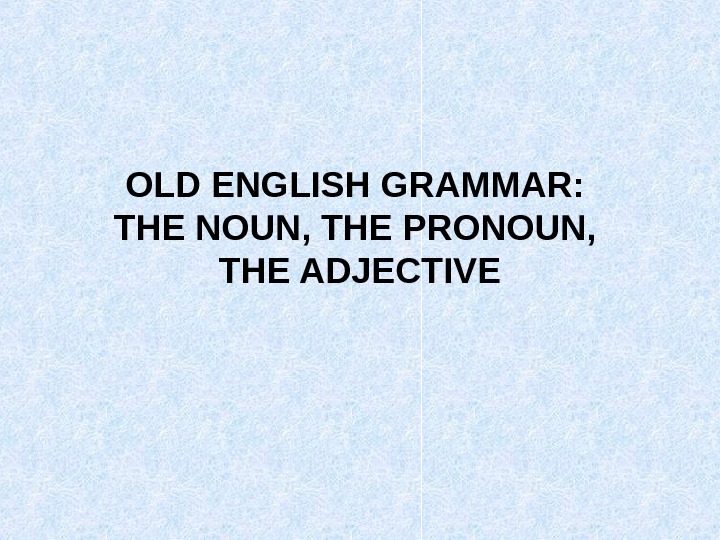




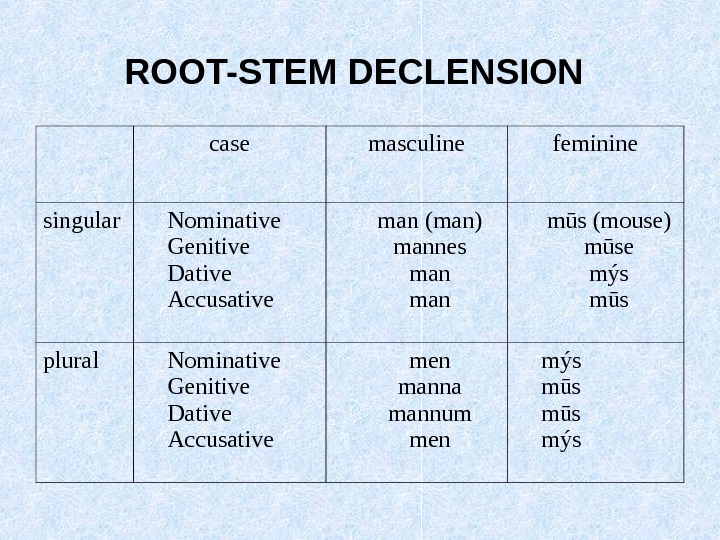



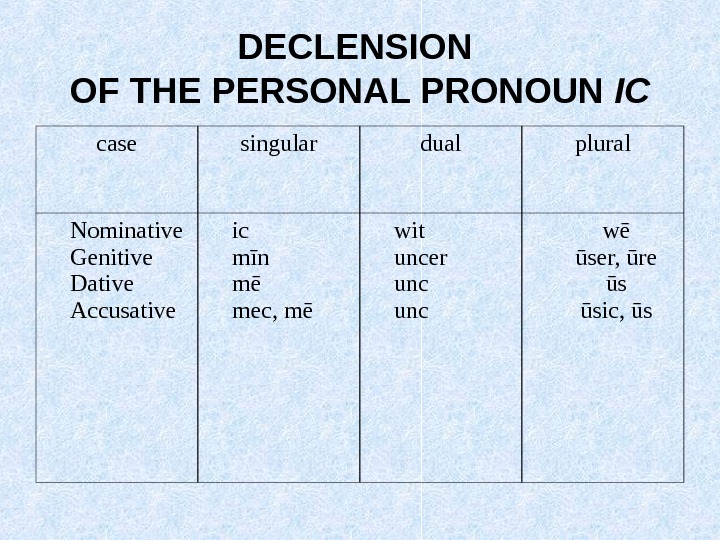

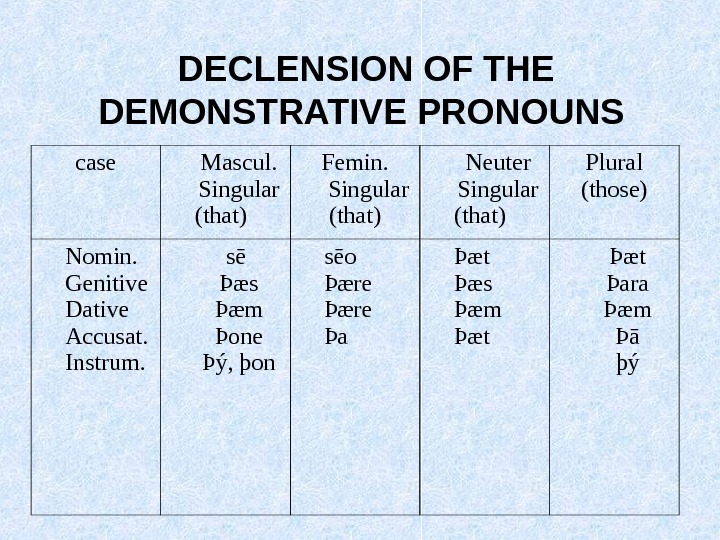

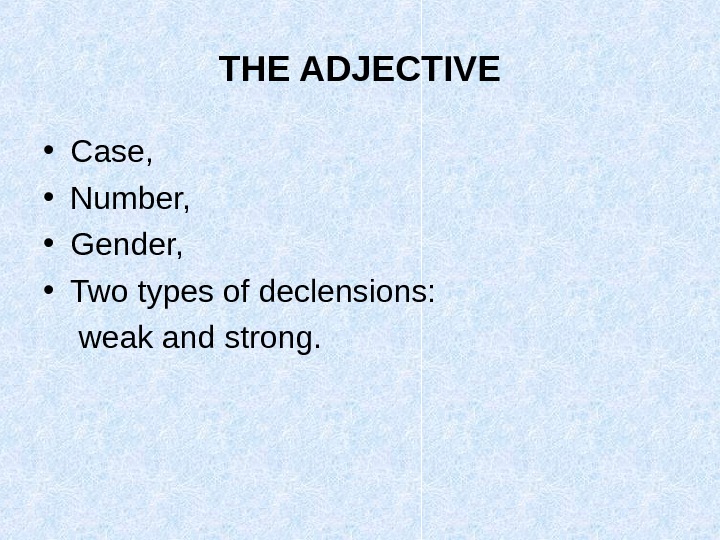
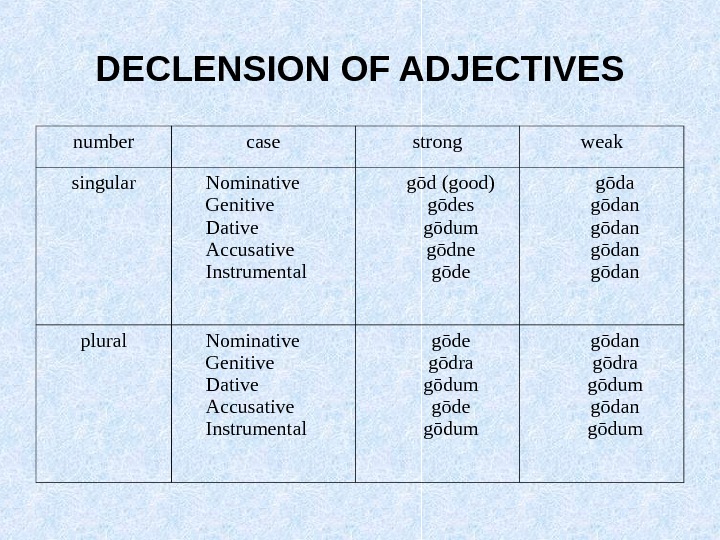


old_english_grammar_noun_pronoun_adjective.ppt
- Размер: 101.5 Кб
- Количество слайдов: 17
Описание презентации OLD ENGLISH GRAMMAR: THE NOUN, THE PRONOUN, по слайдам
 OLD ENGLISH GRAMMAR: THE NOUN, THE PRONOUN, THE ADJECTIV
OLD ENGLISH GRAMMAR: THE NOUN, THE PRONOUN, THE ADJECTIV
 THE NOUN • Gender : Masculine, Feminine and Neuter. • Number: Singular and Plural: fisc – fiscas; tōð – tēð • Case : Nominative, Genitive, Dative, Accusative. (Genitive) OE thæs cyninges brōðor — “that king’s brother”.
THE NOUN • Gender : Masculine, Feminine and Neuter. • Number: Singular and Plural: fisc – fiscas; tōð – tēð • Case : Nominative, Genitive, Dative, Accusative. (Genitive) OE thæs cyninges brōðor — “that king’s brother”.
 NOUN DECLENSIONS (STEMS) • Strong (vowel) declension: a -stem, ō -stem, u -stem and i -stem. • Weak (consonant) declension: n -stem , r -stem , s -stem. • Root-stems: the root was equal to the stem.
NOUN DECLENSIONS (STEMS) • Strong (vowel) declension: a -stem, ō -stem, u -stem and i -stem. • Weak (consonant) declension: n -stem , r -stem , s -stem. • Root-stems: the root was equal to the stem.
 STRONG (VOWEL) DECLENSION A-stems Ō — stems Masculine Neuter Feminine Sin gu- lar Nominative Genitive Dative Accusative fisc (fish) fisc es fisc e fisc scip (ship) scip es scip e scip tal u (tale) tal e Plural Nominative Genitive Dative Accusative fisc as fisc a fisc um fisc as scipu scip a scip um scip u tala, -ena tal um tal a, -e
STRONG (VOWEL) DECLENSION A-stems Ō — stems Masculine Neuter Feminine Sin gu- lar Nominative Genitive Dative Accusative fisc (fish) fisc es fisc e fisc scip (ship) scip es scip e scip tal u (tale) tal e Plural Nominative Genitive Dative Accusative fisc as fisc a fisc um fisc as scipu scip a scip um scip u tala, -ena tal um tal a, -e
 WEAK (CONSONANT) DECLENSION Case masculine feminine neuter Singular Nominative Genitive Dative Accusative nama (name) naman tunge (tongue) tungan eage (eye) eagan eage Plural Nominative Genitive Dative Accusative naman namena namum naman tungena tungum tungan eagena eagum eagan
WEAK (CONSONANT) DECLENSION Case masculine feminine neuter Singular Nominative Genitive Dative Accusative nama (name) naman tunge (tongue) tungan eage (eye) eagan eage Plural Nominative Genitive Dative Accusative naman namena namum naman tungena tungum tungan eagena eagum eagan
 ROOT-STEM DECLENSION case masculine feminine singular Nominative Genitive Dative Accusative man (man) mannes man mūs (mouse) mūse mýs mūs plural Nominative Genitive Dative Accusative men manna mannum men mýs mūs mýs
ROOT-STEM DECLENSION case masculine feminine singular Nominative Genitive Dative Accusative man (man) mannes man mūs (mouse) mūse mýs mūs plural Nominative Genitive Dative Accusative men manna mannum men mýs mūs mýs
 THE PRONOUN • personal, • demonstrative, • interrogative, • possessive, • indefinite, • relative.
THE PRONOUN • personal, • demonstrative, • interrogative, • possessive, • indefinite, • relative.
 PERSONAL PRONOUN • 1 st pers. : Ic, wē; • 2 nd pers. : ðu, gē; • 3 rd pers. : hē, hēo, hit; hī /hīe.
PERSONAL PRONOUN • 1 st pers. : Ic, wē; • 2 nd pers. : ðu, gē; • 3 rd pers. : hē, hēo, hit; hī /hīe.
 CATEGORY OF NUMBER person singular dual plural 1 st ic wīt wē 2 nd ðu gīt gē 3 rd (Masc. ) Hē — hī / hīe (Fem. ) Hēo — (Neut. ) Hit —
CATEGORY OF NUMBER person singular dual plural 1 st ic wīt wē 2 nd ðu gīt gē 3 rd (Masc. ) Hē — hī / hīe (Fem. ) Hēo — (Neut. ) Hit —
 DECLENSION OF THE PERSONAL PRONOUN IC case singular dual plural Nominative Genitive Dative Accusative ic mīn mē mec, mē wit uncer unc wē ūser, ūre ūs ūsic, ūs
DECLENSION OF THE PERSONAL PRONOUN IC case singular dual plural Nominative Genitive Dative Accusative ic mīn mē mec, mē wit uncer unc wē ūser, ūre ūs ūsic, ūs
 DEMONSTRATIVE PRONOUN • Masculine: sē, • Feminine: sēo, • Neuter: thæt • Plural: thæt
DEMONSTRATIVE PRONOUN • Masculine: sē, • Feminine: sēo, • Neuter: thæt • Plural: thæt
 DECLENSION OF THE DEMONSTRATIVE PRONOUNS case Mascul. Singular (that) Femin. Singular (that) Neuter Singular (that) Plural (those) Nomin. Genitive Dative Accusat. Instrum. sē Þæs Þæm Þone Þý, þon sēo Þære Þa Þæt Þæs Þæm Þæt Þara Þæm Þā þý
DECLENSION OF THE DEMONSTRATIVE PRONOUNS case Mascul. Singular (that) Femin. Singular (that) Neuter Singular (that) Plural (those) Nomin. Genitive Dative Accusat. Instrum. sē Þæs Þæm Þone Þý, þon sēo Þære Þa Þæt Þæs Þæm Þæt Þara Þæm Þā þý
 POSSESSIVE PRONOUNS • A separate class of pronouns: OE his mōdor — Mod. E his mother; OE sunu mīn “my son” – Mod. E son mine (literally)
POSSESSIVE PRONOUNS • A separate class of pronouns: OE his mōdor — Mod. E his mother; OE sunu mīn “my son” – Mod. E son mine (literally)
 THE ADJECTIVE • Case, • Number, • Gender, • Two types of declensions: weak and strong.
THE ADJECTIVE • Case, • Number, • Gender, • Two types of declensions: weak and strong.
 DECLENSION OF ADJECTIVES number case strong weak singular Nominative Genitive Dative Accusative Instrumental gōd (good) gōdes gōdum gōdne gōdan gōdan plural Nominative Genitive Dative Accusative Instrumental gōde gōdra gōdum gōde gōdum gōdan gōdra gōdum gōdan gōdum
DECLENSION OF ADJECTIVES number case strong weak singular Nominative Genitive Dative Accusative Instrumental gōd (good) gōdes gōdum gōdne gōdan gōdan plural Nominative Genitive Dative Accusative Instrumental gōde gōdra gōdum gōde gōdum gōdan gōdra gōdum gōdan gōdum
 DEGREES OF COMPARISON • The Comparative degree: the suffix –ra , • The Superlative degree: the suffix -est/-ost • Vowel alternations due to palatal mutation • Suppletive forms
DEGREES OF COMPARISON • The Comparative degree: the suffix –ra , • The Superlative degree: the suffix -est/-ost • Vowel alternations due to palatal mutation • Suppletive forms
 SOFT, BLÆC, EALD, GŌD, MICEL Form-buildin g means Positive Comparative Superlativ e Mod. E Suffix softra softost soft Suffixes plus vowel alternation s blæc eald blæcra ieldra blacost ieldest black old Suppletive forms gōd micel betera māra betst mæst good big, much
SOFT, BLÆC, EALD, GŌD, MICEL Form-buildin g means Positive Comparative Superlativ e Mod. E Suffix softra softost soft Suffixes plus vowel alternation s blæc eald blæcra ieldra blacost ieldest black old Suppletive forms gōd micel betera māra betst mæst good big, much
